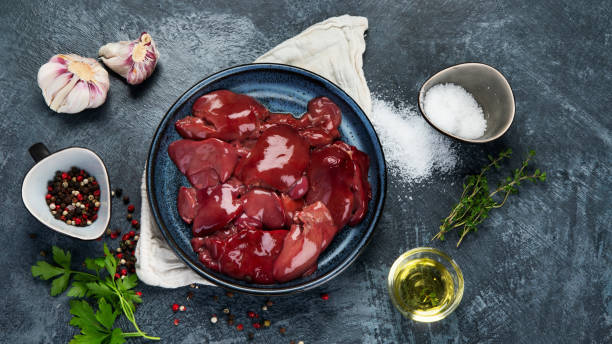You bought way too much chicken liver, and you need some way to store the leftovers. You may be the only one in your household who enjoys this meat, so even a small container for a single dish is too big.
Or you wanted to make a pie or chicken liver crostini, but things went wrong and you had to postpone it. That means you need a way to store those livers for another week or so.
As you know, fresh meat doesn’t last more than a couple of days, so tossing that container of livers in the fridge isn’t an option. Then you get the idea to freeze them. So can you freeze livers?
Before we continue, you should know that while this article focuses on the meat of chicken liver, the same rules apply to the liver of other animals. Whether you’ve stocked up on chicken, beef, pork, duck, turkey, or lamb liver, this article is for you.
Can you freeze livers?
Often you can buy containers of frozen fresh liver, making it pretty obvious that freezing this meat is a thing. And like other meats, it freezes quite well. In other words, it’s usually hard to tell if the liver you sautéed or broiled was frozen or not.
It is important to remember that the liver is a delicate piece of meat. This means that cooking them twice usually degrades their flavor and overall quality. For this reason, I highly recommend freezing fresh liver.
If you go the opposite route, ie cook first and then freeze, your results will depend on the recipe you follow. Some dishes, such as a pie, freeze quite well. But sautéing chicken livers twice (before freezing and after thawing) might not be such a good idea. It’s not a chicken breast that you can cook, freeze, and reheat, and it tastes just fine, too.
Long story short, if you don’t know that the liver you love to cook freezes well, freeze fresh liver.
How do you freeze livers?
Freezing livers is straightforward and only takes a few minutes. All you need are some paper towels, some freezer bags or containers, and some freezer space. With all of that prepared, you’re good to go. Here’s what you need to do:
- Drain excess liquids. Fresh liver is usually quite moist, and we don’t need that extra moisture when freezing. The easiest way to get rid of them is to place the liver on paper towels for a few minutes.
- Portion the meat. If you’re freezing more livers than you’ll need for a single dish, divide them into several bowl-sized portions. This way you can easily defrost as much meat as you need.
- Package. Airtight containers and freezer bags work well for this purpose. You can even use the container the livers come in if you like. While I prefer containers, if you’re short on freezer space, using bags is a better option. If using bags, squeeze out the air before sealing.
- Put it in the freezer. The last part of our short journey is getting the packaged meat where it belongs – in the freezer.
After a few hours, depending on the amount, the meat is frozen solid.
You can keep it there for months, but like pretty much any other food, the longer it stays in the freezer, the worse the quality will be. For best results, try to use these livers within 3 to 6 months. That shouldn’t be a problem if you’re only delaying that pie or crostini by a week.
Read Also: Can you freeze cucumbers?
How do you thaw frozen livers?
To thaw frozen livers, transfer the container or bag from the freezer to the refrigerator. Let it thaw there slowly overnight for best results.
If you’re pressed for time, you can speed things up a bit by submerging the bag or container in a bowl of lukewarm tap water. This way, the meat should be thawed within 3 to 6 hours, depending on the amount. That way you can start defrosting in the morning and have it ready when you get home after work.
How are frozen and thawed livers used?
As I mentioned earlier, freezing and thawing doesn’t affect the flavor or texture of liver meat that much. That means you can use it in exactly the same way as fresh liver.
I prefer simple dishes, like onion-sautéed liver, because they’re easy to cook and can be prepared in 30 minutes or less. However, if you prefer more sophisticated dishes like pies, stews, or fried chicken livers, using thawed liver shouldn’t be a problem either.
